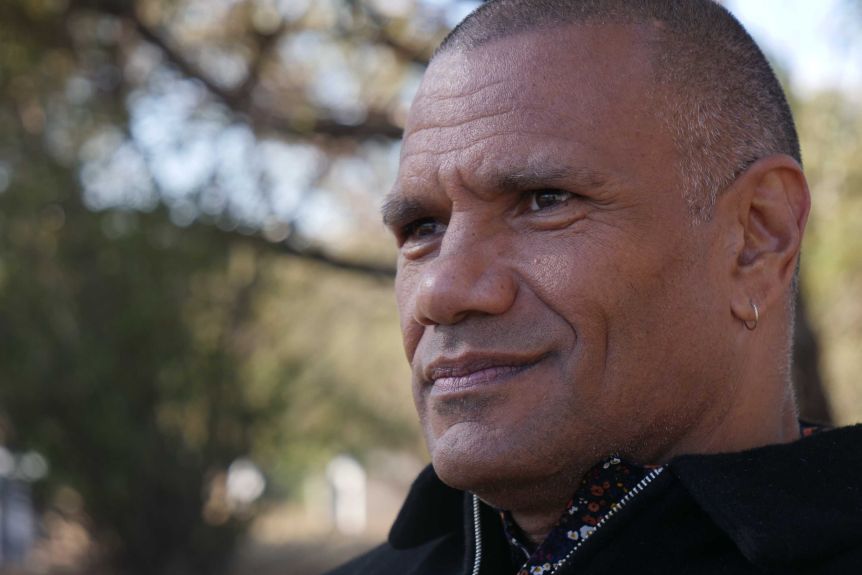Ex-prisoner says more services needed in Western Australia’s prisons to reduce recidivism


The last time Wesley Ford was released from prison he made a deal with himself — either get busy dying or get busy living.
For more than 20 years, the 47-year-old, who identifies as a gay Whadjuk/Ballardong man, battled with drug addiction that fuelled two decades of crime and 13 prison sentences.
"This time when I went back to prison … I felt trapped, I didn't know what to do," he said.
"I felt powerless over this thing that had a hold on me for 20-plus years, but something stopped me and I said to myself, 'You either get sober, get busy dying or get busy living'.
Mr Ford was released on parole this year and decided to turn his life around through a drug rehabilitation program.
Services there, but not enough
Mr Ford participated in several programs during his last stint in prison, which he said was a key to being granted parole.
But having been through prison releases more than a dozen times, Mr Ford said the services available in WA's prisons were not adequate.
"To me it wasn't enough, because 13 times will tell you that wasn't enough," he said.
"There were services there, but it is such a farce, because the services come into the prison and the prisoners are able to access these services, but because they are so few and far between hardly anyone can get onto them.
"Those who do get onto them, it's mainly for people who are first-timers or who have just come in rather than for people who are recidivists like myself.
Recidivism a challenge across the board
According to the Department of Justice, 40.1 per cent of adults in Western Australia returned to prison within two years of being released during the 2018-19 financial year.
In 2014 then-Corrective Services commissioner James McMahon set a goal to reduce recidivism rates by 6 per cent each year.
The current Commissioner, Tony Hassall, said the figure was not an accurate representation on the efforts made by both the department and offenders to rehabilitate.
"That is only one measure and we use that measure because it is a comparison across Australia," he said.
"What it [recidivism] does not measure is if you have got a really serious, violent offender, and you do all that work and they come back into the system, but they come back into the system for a less serious offence, which is still bad, we know they’ve offended, but they are less dangerous, well that's progress for that individual.
The department uses measures including education, health and mental health services, and employment opportunities to reduce reoffending behaviour.
Mr Hassall said, despite this, prison populations made reducing recidivism a challenge for all jurisdictions.
"We have about 6,800 offenders in WA, and in an ideal world you want to tailor services to those individual offenders and that is impossible," he said.
"We look at the factors that promote desistance from crime … it is evidence-based, what-works intervention.
Rehabilitation important for community approach
In 2015, 67 per cent of prison entrants in Australia reported using an illicit drug in the 12 months prior to entering prison and half of all prison entrants reported using methamphetamine.
David Gunter, who has worked in prisons in Queensland and Victoria, is now the general manager of Fresh Start's Northam-based recovery program, which offers a post-prison release program for offenders who struggle with addiction.
"I was curious about what keeps bringing people back to prison," he said.
"I saw a lack of resources when it came to addressing people with substance abuse.
"In some cases, we saw people come to prison with absolutely no help and, on the other hand, I saw people come to prison as non-addicts and all of a sudden pick up a dependency, whether it be through the methadone program or drugs coming in through the prison.
The Fresh Start program begins working with people before their release from prison.
Mr Gunter said a therapeutic approach to rehabilitation was vital to reduce reoffending.
"At the end of the day, of course we need prisons, we understand that, but I think the old notion of years ago you hear these really naive attitudes of 'Lock them up and throw away the key'," he said.
"The reality is people are going to get out and I think that, as a community member, I would rather see people rehabilitated when they do come out the other end.
Through Fresh Start, Mr Ford is studying for a certificate IV in mental health, has obtained employment and plans to study a graduate certificate in human rights.
"I hope to one day be living a life of value, meaning and purpose," he said.
"I hope to contribute to society … I want to make a difference to my community."
 Pathways Drug Rehabilitation Luxury Addiction Treatment & Detox Center
Pathways Drug Rehabilitation Luxury Addiction Treatment & Detox Center


